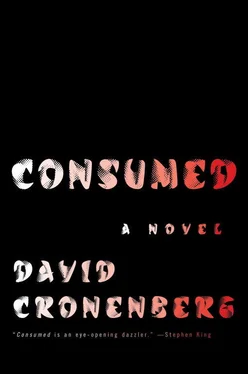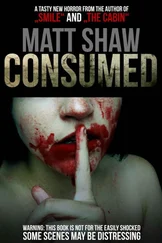“Well, your former student Chase Roiphe will eventually tell Nathan some secrets about you, and Nathan will tell me, and I’ll tell the world.”
Arosteguy looked up at her now with an appreciative smile. “Very good, and no less than I would expect from Priestess Naomi.” He offered the iPad back with a slight bow, holding it with both hands flat underneath it, palms up, like a sacramental plate—or a Japanese business card. “But the secrets have already been told without a word being spoken, and they are all right in here.”
“GONNA HAVE KIDS someday, Nate?”
They sat side by side on the rough-cut stone patio overlooking the narrow lap pool and the fussy, overgrown rock pond harboring some very butch koi. Beyond that there was a slate-roofed coach house which looked original—that is, about a hundred years old—overlooked by a bland institutional apartment block. Nathan idly wondered how many tenants were watching them through binoculars and urban telescopes. He could hear the trickle of a small artificial stream or waterfall but couldn’t see it from where he was sitting under the vast canvas teak-strutted garden umbrella that sprouted from a gasketed hole in the center of their table, also vast, also teak. A small, anxious Asian woman had brought them coffee and nuts and berries in bowls.
“I have no idea, Barry.”
“You’ve probably got a steady girl somewhere, though, haven’t you?”
The sun was high and hot and Roiphe had polarized sunglass clip-ons over his glasses that were even bigger than the glasses themselves; the chromed lower edges of the clip-ons dug into the doctor’s flaccid cheeks.
“I sort of do, I guess.”
Roiphe was playing with a khaki mesh-vented Tilley hat, twisting the brim, crushing the crown and re-blocking it, putting it on and off his head. “Do I detect some sexual ambivalence there? You know, there was a big vogue a while back where GPs dabbled in sex therapy. I’m not sure how healthy that really was, but it was pretty darned common. You can see the psychopathology right there. I refused to get into it. A lot of my colleagues got into big trouble with it. Busted up a lot of marriages.”
“Ambivalence, I guess. I wouldn’t say sexual.” The blueberries were especially good, but the raspberries had gone soft, mushy, and sour. “Just the commitment problem, I would say. Not just committing to a particular woman, but committing to a particular future. Kinda banal and ordinary.” He rotated his Nagra so that he could be sure it was recording at a decent level given the heavy ambient noon traffic noise. “But speaking of psychopathology, I have to wonder about the deal here, you playing the role of shrink to your own daughter.”
Roiphe chuckled and poured himself more coffee with a shaky hand, spilling a bit onto the brim of the hat that now rested next to his cup. “Aren’t you the cheeky one. Well, to begin with, that’s how I always approached being a parent. I’m naturally analytical. I’m clinical. I can’t fight it. That doesn’t mean I’m cold, although maybe my poor dead wife would’ve disputed that. But goddammit, what would you be doing? We sent her off to France, Rose and I, with the best of intentions—as you can imagine, given the expense. She was such a bright girl, Chase, and kinda European in her outlook. She didn’t look to the States for excitement or inspiration.
Partially it was the language thing. Of course there’s a lot of Spanish going on in the US, but she wanted the whole deal, a country where English was basically not spoken, and the culture was based around that language. And then, of course, there was the Quebec thing. She told you about that?”
“She did, yes.”
“Okay, so anyways, we pack her off to France, she gradually stops phoning, then stops emailing, and then we just don’t hear from her. Not a word. And then Rose dies, a big fat horrible surprise. She was in great shape for an old babe—we can get into that sometime, if you think it’s relevant to the book, but it might not be, depending. So Rose dies, and I can’t find a way to let Chase know about it, and so I get in touch with this Arosteguy guy, and I get a really weird vibe from him. So I fly over to Paris looking for her, and eventually I find her with the help of this kid, a student, Hervé Blomqvist—what a name; I can barely get my mouth around it—a colleague of hers. It seems she was living with him. Something traumatic happened to her, and she left that great little apartment on the Left Bank that we found for her and moved in with this Blomqvist. I guess that’s a Norwegian or maybe Swedish name, but he seemed totally French to me. You know, kinda saucy and arrogant, but in the end really helpful and okay. You’d have to say that ultimately he was an okay kid. I think she would have been in terrible trouble without him. You might eventually want to look him up to get his take on the whole Sorbonne thing. For the book.”
“I might,” said Nathan, thumbing exactly that note into his iPhone’s Notes app. “How do you spell that name, exactly?”
“I’ll give you all the particulars when we get back inside. Never was much of a speller myself. I’ve got it lying around somewhere. And an address and a phone number. They’re a year old now, but you never know. And now, speaking of the French language, when I got Chase back she was a helluva basket case, and it all seemed to do with speaking, or not speaking, French, and that the Arosteguys—turns out there were two of them, a man and a woman, married professors—said such terrible things to her in French that she was traumatized. And when I asked her what they could possibly have said that could do that, she said she couldn’t recall it because they spoke the words in French, and French was gone from her brain— exiled was the word she used, exiled from her brain—as was French in general, and so she couldn’t remember anything. And then she started doing these weird ritualistic things and eating bits of her own skin, stuff that you’ve seen, all in a trance, and I can’t for the life of me see what that has to do with the terrible French words being spoken thing. And that’s basically where we are. The old mystery wrapped in an enigma, or whatever the hell that was. And so that’s having kids too. It’s rougher than you can imagine. That’s why I asked you.”
“Barry, you mentioned ‘experiments’ in connection with Chase’s condition. I wonder what you meant. What exactly is your course of therapy for her?”
“I’m attacking on all fronts, boy. And some of those fronts are weird, lemme tell you.”
“For instance.”
“For instance, up in that third-floor attic space that’s all hers. I bought this house for her, really, you know. Rose never lived here. We’ve only been here a year. I bought it with all the furniture and lights and stuff that they put in to show off the house—what do they call it, staging, home staging. I just wanted a big space of our own when I saw what shape she was in, and that condo downtown on the waterfront that Rose and I had was just too small, too introverted. They couldn’t believe I was serious, but I told them I had no taste and that everything they had done looked fine to me. The woman fought me on that, said the stuff was rented and it was deliberately bland so as not to distract from the house, the property, the space itself. Anyhow, I rolled right on over her and her bosses, and they made it work because it’d been sitting around unsold for over a year.” Roiphe stopped and took a tentative sip of his lukewarm coffee, lost in a sudden reverie. Nathan waited for him to continue but he seemed to think he had answered the question. “Barry, you were saying. Your weird course of therapy.”
“Oh, yeah, yes. So I collaborated in a way with Chase on a solution to her distress, which she never really admitted to, and she said, ‘There’s a thing called a 3D printer, and I want one to play with, I think it might relax me.’ That’s the term she used, relax me , and it became our code for cure me , or maybe heal me a little bit .”
Читать дальше
Конец ознакомительного отрывка
Купить книгу







![David Jagusson - Fesselspiele mit Meister David [Hardcore BDSM]](/books/486693/david-jagusson-fesselspiele-mit-meister-david-har-thumb.webp)




